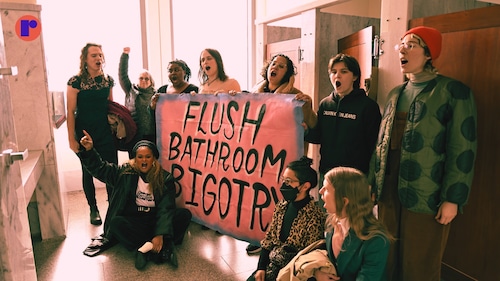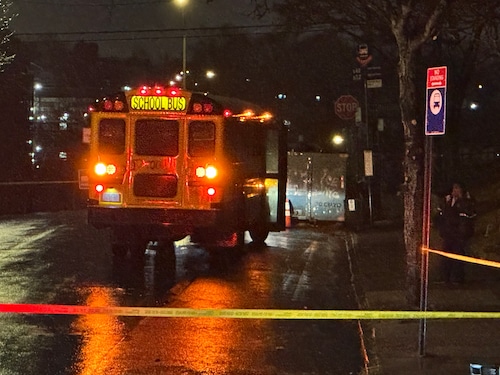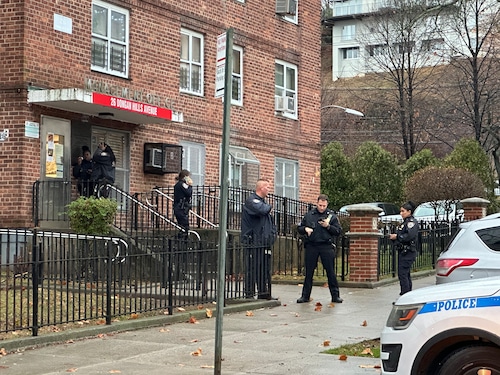On a chilly December morning, Chase Strangio stood before the Supreme Court with the burden of history bearing down on him. Trans people have left a heritage of battling for justice, and as the first openly transgender lawyer to argue before the country’s highest court, he carried not only legal briefs but also the echoes of protests from the Compton Cafeteria riots to the Stonewall uprising.
The chants of the hundreds of demonstrators outside rose above the marble columns as they rushed against police barricades. The Gender Liberation Movement (GLM), a nationwide collective that develops policy, media, and direct action initiatives centered on bodily autonomy and self-determination in response to gender-based threats, coordinated the event.
According to Eliel Cruz, a co-founder of GLM, they want transgender individuals to disappear. And the best way to start that kind of bigger initiative is with young people.
The grassroots organization, which combines policy lobbying with street rallies, has become a major force in organizing protests against gender-based limitations across the country. Inside, GLM activists led shouts calling for protection of transgender healthcare rights while the Supreme Court heard arguments.
In a protest against new limitations suggested by House Speaker Mike Johnson and Representative Nancy Mace (R-S.C.), 15 activists were arrested the following day in a Capitol restroom. The limits targeted even Sarah McBride (D-Del.), the first openly transgender member of Congress. Chelsea Manning, a former Army intelligence analyst who served seven years in prison for leaking classified documents about civilian casualties in the Iraq and Afghanistan wars, and Raquel Willis, a Black transgender activist who spearheaded the historic Brooklyn Liberation March and popularized the slogan “I believe in Black trans power,” were among those arrested.
In a statement, House Speaker Mike Johnson justified the bathroom restrictions, claiming that the Capitol’s single-sex restrooms are only for people of that biological sex. Advocates of comparable state-level limitations contend that they uphold the privacy rights of women.
Johnson told The Tennessean that women should have their own areas. This opinion is in line with conservative lawmakers who have proposed similar legislation in state legislatures.
Today’s movement leaders are aware of the historical analogies. Activists follow in the footsteps of trailblazers like Marsha P. Johnson and Sylvia Rivera as Republican-led states push hundreds of measures that restrict transgender rights and healthcare. Legal documents, rather than bricks, are the weapons this time, and the combat is not simply the city streets but also the marble corridors of power.
How LGBTQ+ activism made everything better for everyone
In the US, LGBTQ+ activists have become a vital component of civil rights campaigns. According to Chris Sanders, executive director of the Tennessee Equality Project (TNEP), we belong to every community that is viewed from the perspectives of color, ethnicity, religion, gender, handicap, and class. Therefore, all types of discrimination have an impact on us.
Sanders cited notable individuals such as Pauli Murray, a civil rights advocate, attorney, and co-founder of the National Organization for Women, who allegedly used both the she/her and they/them pronouns; Audre Lorde, a trailblazer in Black feminism; and Bayard Rustin, a key organizer of the historic March on Washington, who adopted civil disobedience strategies from Indian organizers, creating a famous Civil Rights Era tactic.
The list is endless. A Jewish American who founded ACT UP during the HIV/AIDS pandemic, Larry Kramer had an impact on healthcare policymakers, such as Anthony Fauci, who brought up Kramer during COVID-19. Transgender individuals have fought on multiple occasions to defend the constitutional rights of life, liberty, and the pursuit of happiness as well as the First Amendment right to peaceful assembly. Examples of this include Marsha P. Johnson and Sylvia Rivera at Stonewall, who both organized against police brutality, and Tamara Ching, a trans Asian American woman who participated in the Compton Cafeteria revolt. Harry Weider, who joined ACT UP and promoted public housing, is a hard-of-hearing kid of Holocaust survivors who has dwarfism.
Rev. Martin Luther King, Jr. marched on Selma alongside Kiyoshi Kuromiya, an openly gay Japanese American who survived incarceration during World War II and was his personal assistant. Kuromiya took care of King’s children following his murder. Kuromiya represented the Gay Liberation Front Philadelphia chapter at the 1970 Black Panther Convention, where she was the only openly gay panelist. Huey P. Newton, a co-founder of the Black Panther Party, also supported the women’s and LGBTQ+ liberation movements in that same year.
According to Manuel Hernndez, who uses the pronouns li/naya and he/they, the success and prominence of LGBTQ+ rights campaigns have spurred more general discussions on intersectionality and inspired other oppressed groups to fight for their rights. Hernndez is the executive director of ALMA Chicago, an organization that has fought for the equality and equitable treatment of the Latinx LGBTQ+ community since the AIDS crisis. The struggle for equality has become more extensive and interwoven as a result of this knock-on impact.
Trans people are still left behind
Despite more general LGBTQ+ victories, transgender persons continue to be marginalized and significantly impacted by contemporary political discussions. Less than 1% of elected figures in the United States publicly identify as LGBTQ+, despite the historic election of openly transgender Sarah McBride to Congress during the most recent election cycle. Elections of transgender candidates have decreased by 6% since 2017, according to the Victory Institute, but elections of other LGBTQ+ candidates have increased. Cis white homosexual men continue to dominate representation in government. Advocates claim that because of this underrepresentation, transgender people are at risk of prejudice and political exploitation from both parties.
“We are the easiest community to be used for political points by politicians, including some Democrats,” stated Blossom C. Brown, an Afro-Native trans activist from Los Angeles who has been on the trans rights podcast Transparency and in viral content at Jubiliee’s Middle Ground discussions.
During a White House Pride Month reception in 2015, Jennicet Gutierrez, co-founder of the trans Latina advocacy group Familia TQLM, challenged then-President Barack Obama about gender-based abuse against trans women in ICE detention facilities. She was escorted out of the event by security, and media sources characterized her behavior as heckling. The National LGBTQ Task Force and the Human Rights Campaign were among the prominent LGBTQ+ groups who endorsed Vice President Kamala Harris during her 2024 presidential campaign. However, the 2024 Democratic National Convention did not include trans speakers.
When migrant caravans arrived at the U.S.-Mexico border in 2018, then-President Donald Trump called them “hardened criminals.”The majority of the transgender migrants in some of the early recorded caravans were displaced by internal crises, such as U.S.-backed coups throughout Latin America, and were singled out by police because of their sexual orientation, gender identity, and self-expression.
The Transgender Law Center documented the first official migrant Rainbow Caravan in August 2017, including 11 transgender people and the remaining LGB people. A number of LGBTQ+ couples got married at the Mexican border the following year before crossing.
Cruz also cautioned about analogous, perhaps fatal outcomes to the fight for abortion rights. He stated that thousands and thousands of families and trans youth would not be able to get that care. They may have to leave, or we will have to figure out how to obtain it illegally in their state.
People who identify as transgender have started to leave the US. They have escaped to nations with welcoming immigration laws for transgender asylum applicants, such as the Netherlands, France, and New Zealand. A 2023 study by Data for Progress found that 41% of trans adults and 43% of trans individuals between the ages of 18 and 24 have thought about relocating. Along with 9% of LGBTQ+ persons 65 and older, 8% of trans adults, including those between the ages of 18 and 24, have already left.
According to Brown, the trans community will be far more affected by the Supreme Court’s decision than the LGBTQ community at large. In this movement, we need to awaken that.
What s at stake
Gender-affirming care is applicable to cisgender people as well, even if the Supreme Court protests over healthcare for trans youth continue to dominate the discussion. The majority of people seeking gender-affirming care are cisgender, according to a Hastings Center analysis. Brown claimed that these problems have consistently worked against us. [S]The goal of ystemic oppression is to maintain us as the outsider. In actuality, though, we are far from it!
A second conservative plan to protect kid innocence in Tennessee’s Knox County campaign by reducing money for programs deemed sexually explicit was successfully thwarted in November 2024 by TNEP and other organizations. While the four-page paper characterized forbidden content as dangerous to minors, matter, nudity, obscene, prurient interest, and sexual conduct, opponents referred to it as being vague. Numerous charitable organizations contended that services including programs that respond to and shield children from abuse were at danger due to the ambiguous ruling. Critics referred to it as a flimsy anti-drag campaign that might have had catastrophic effects for the whole state.
Marriage equality is still prohibited by 35 state constitutions. Although the Supreme Court’s 2015 Obergefell v. Hodges decision overturned these prohibitions, some legal experts are concerned that the current court may do the same, as it did with abortion.
LGBTQ+ initiatives pertaining to universal human rights, such as healthcare and employment discrimination, have been undone by other Supreme Court decisions. The Supreme Court ruled in favor of wedding website designer Lorie Smith in 2023, stating that she was allowed to refuse services to a lesbian couple. The lawsuit, however, focused on a heterosexual husband and wife who said he never made a request. Due to this verdict, services can now be denied to anyone, regardless of gender or sexual orientation.
The Biden administration was unable to implement new regulations in July of this year that would have guaranteed healthcare for transgender Americans. An unexpected link between trans rights and climate justice was made when the Supreme Court overturned the 1984 Chevron v. Natural Resources Defense Council verdict, which diminished the political power of the Environmental Protection Agency and hampered federal enforcement of rules.
The Trump administration terminated the DACA program in 2017, the same year as the Rainbow Caravan, but the Supreme Court overturned that decision in 2020. The livelihood of many individuals vital to the U.S. economy, including as the farm sector, which employs a 73% migrant workforce, may be in jeopardy due to Trump’s promises of mass deportation, which in part included his distorting of the trans fight to suit his purpose.
What comes next
In order to develop universal answers, activists frequently prioritize the demands of the most vulnerable. According to Cruz, everyone’s rights and needs will be met by attending to the needs of Black trans women, including disabled Black trans undocumented women who speak English as a second language. He asserted that this applies to all Americans. It’s not something that only queer or Black transgender individuals require.
Organizers intend to continue the trans history of activism and use direct action to persuade the Supreme Court to support them in the face of 574 anti-LGBTQ bills that are floating in state legislatures and the ensuing mental health crisis for trans youngsters. Brown declared, “We will never give up on our trans youth.” I’m confident that the LGBTQ community will react with even more potent change-making tools.
Sanders urged people to attend the Day on the Hill action and Zoom phone banks organized by TNEP to advocate for LGBTQ+ rights, which they will later reveal.
Hernndez said that ALMA will organize in Chicago by working with legal groups like Equality Illinois and educating the general public about transgender issues. Currently, ALMA provides economic mobility and empowerment through initiatives like its Latinx LGBTQ+ Advocacy Leadership Institute. We’ll also look for ways to provide trans adolescents and families with financial support when they face new legal or medical obstacles, if at all possible,” Hernndez said.
Cruz demanded in New York City that the Transgender Law Center and other trans-led legal initiatives across the country receive more financial and volunteer assistance.
“By promoting inclusivity, we have improved America,” Brown stated. Regretfully, this poses a threat to certain communities. Not a problem for us! We’ll keep fighting.
Queer/nonbinary Black Asian dancer, writer, and organizer Rohan Zhou-Lee (They/Siya/(T)/Elle). They have written for magazines like Newsweek, Prism Reports, NextShark, and more. They are a 2023 Open City Fellow at the Asian American Writers Workshop. Siya is also the creator of the Black-Asian-Blasian grassroots solidarity group, the award-winning Black March, which has been highlighted on CNN, NBC Chicago, USA Today, WNYC, and other media. Zhou-Lee has given speeches at Harvard University, the University of Tokyo, the 2022 Unite and Enough Festivals in Zurich, New York University, and Switzerland on a variety of topics, including organization and human rights.The diary of a firebird
Note: Every piece of content is rigorously reviewed by our team of experienced writers and editors to ensure its accuracy. Our writers use credible sources and adhere to strict fact-checking protocols to verify all claims and data before publication. If an error is identified, we promptly correct it and strive for transparency in all updates, feel free to reach out to us via email. We appreciate your trust and support!






+ There are no comments
Add yours